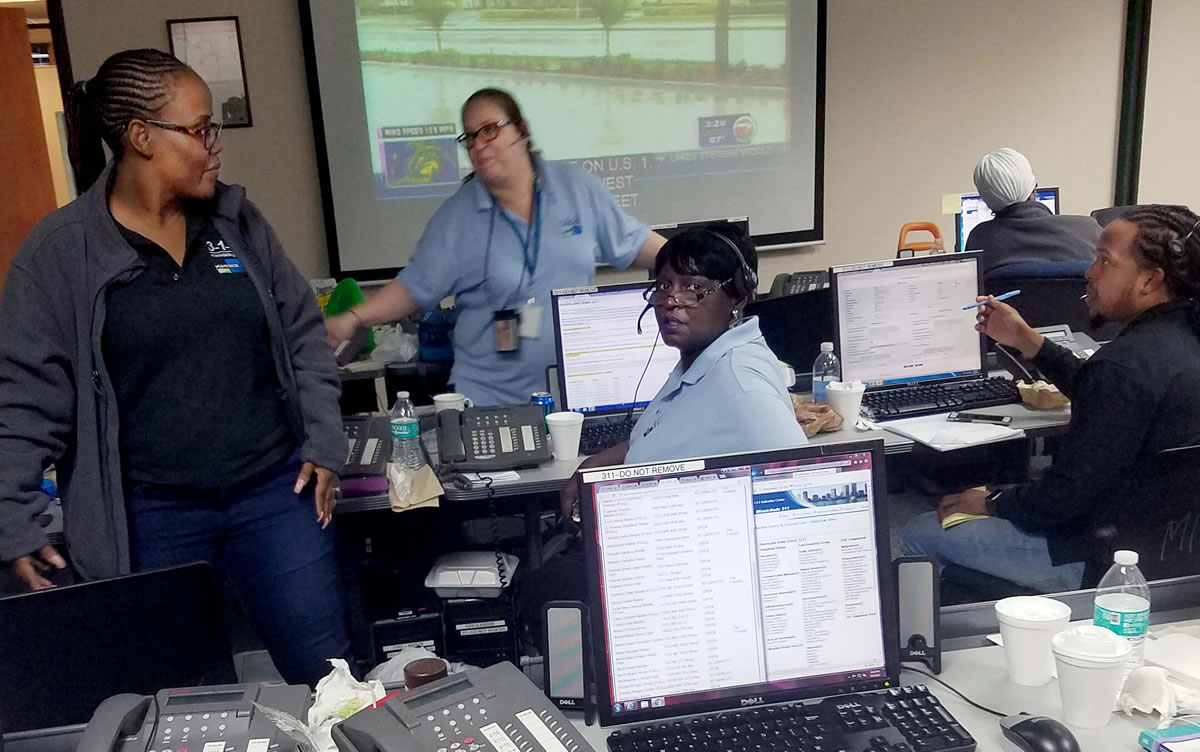

Share
From dispatchers and utility line workers to health care professionals and FEMA employees, union members are stepping in to help during and after the devastating hurricanes in the southern United States. Numerous labor organizations also are conducting fundraising to aid affected communities.
Hurricanes Irma and Harvey mark the first time in U.S. history that two Atlantic Category 4 landfalls have occurred in the same year, according to meteorologists. Both storms caused widespread devastation, with at least 70 deaths attributed to Harvey and the numbers still being counted for Irma. Scores of communities are flooded and electrical power was knocked out to hundreds of thousands of people.
In the days leading up to landfall by Irma in Florida, Lorraine “Ms. Purple” Brown and other workers at the Miami-Dade call center calmed fears and routed calls to the appropriate agencies.
“We will be open 24/7 until the danger passes. I’m not leaving until maybe Monday at the earliest,” Brown, a member of AFSCME Local 199, told afscme.org. “When possible, we just close our eyes and sleep a little at our desks – 15 minutes here or there. We have access to showers and food, but all of us would rather be on the phones helping people. We can sleep later.”
AFSCME Florida has at least 17,000 working and retiree members in every corner of the state, the union said.
They work for cities, counties, hospitals, schools, housing authorities, water and sewer plants, sanitation departments and universities from Pensacola in the northwest to Miami in the southeast, from Jacksonville in the northeast to Naples in the southwest, and from Tampa to Orlando across central Florida.
Utility workers from several states, including Minnesota, are in Texas, Florida and other areas hit by the hurricanes to repair downed lines and restore electrical power.
More than 10 million people are without power in Florida due to Irma, the International Brotherhood of Electrical Workers reported. What is being described as the largest power restoration workforce in U.S. history is being deployed – tens of thousands of lineworkers and tree-trimmers in total, including many IBEW members.
“When disasters like Irma strike, you can always count on IBEW lineworkers to be the first on the ground, bringing power back to the people who need it most,” said International President Lonnie R. Stephenson. “To all the linemen, tree-trimmers and more who traveled into the storm to work 16-hour days, 7 days-a-week, I’m grateful to you, and the people of Florida are grateful to you.”
Thousands of IBEW members already are stretched across the Texas and Louisiana coasts to get electricity restored in areas slammed by Hurricane Harvey. Soon, members from the construction branch will be descending on the area for the massive rebuild that lies ahead, the union said.
“These are our friends and neighbors,” said Johnny Johnson, a member of Local 2286 in Beaumont, Texas.
Utility Department Director Donnie Colston said IBEW members in Texas are working 16-hour shifts and many are sleeping in their trucks. Finding a place to shower can be a challenge. So is keeping in touch with loved ones because many cell towers are damaged.
“We’re very proud of the apprenticeship training we provide and the training by our utilities that prepares them for this situation,” Colston said. “We’re very proud of the skills they bring and the dedication they bring to our customers in getting their lights turned back on.”
Health care facilities can be stressed during natural disasters, so National Nurses United has dispatched two teams of volunteers to respond to Hurricane Harvey and is poised to do the same for areas hit by Irma.
“I hope to provide some healing to residents of Houston,” said volunteer RN Dotty Nygard, of Tracy, California, who deployed Sept. 11. “That’s what we do, as nurses; we go where we’re needed, and we help.”
The nation’s response to natural disasters is coordinated by the employees of several federal agencies and departments, including many workers represented by the American Federation of Government Employees. The response involves FEMA, the Departments of Homeland Security, Interior, Agriculture and others, the U.S. Coast Guard, Army Corps of Engineers and many more.
FEMA – the Federal Emergency Management Agency – alone is responsible for rescuing and evacuating thousands of people and distributing millions of meals and liters of water, along with thousands of cots and blankets.
Labor unions across the country are fundraising to help people rebuild their communities and lives.
In response to Harvey, national AFL-CIO Secretary-Treasurer Liz Shuler said the labor federation has donated $100,000 to the Texas AFL-CIO’s Workers Relief Fund and is committed to raising $5 million more in cash aid. The AFL-CIO’s Housing Trust Program will invest $50 million during the next five years to areas affected by the hurricane and will work with local officials to see where it is most needed, she said.
Unions also are getting involved in other ways. The Teamsters union organized a convey of seven trucks from Las Vegas, San Diego, Los Angeles and San Francisco loaded with supplies for the residents of Houston, the union reported. The convoy received a police escort through two states on its way to Texas. The same Locals and Joint Councils coordinated a similar effort for the victims of Katrina in 2005.
“It always feels good to do what you can for our brothers and sisters and other victims of this horrible storm,” said Randy Cammack, president of Joint Council 42 in Pomona, Calf. “I know that these supplies will be put to good use.”
The American Federation of Teachers is part of an effort to create a school supply and basic needs fund for Texas educators affected by Hurricane Harvey.
Here are links to some of the donation sites set up by labor organizations:

